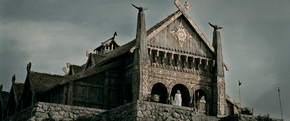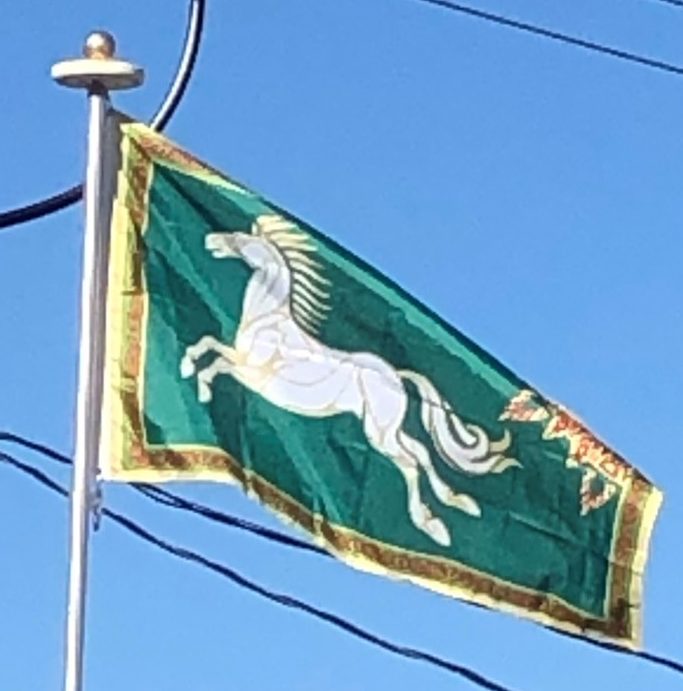Cirion committed the guardianship of Calenardhon to Eorl and his men for three months, during which time the Steward took council to determine what reward he could present to the Éothéod for their heroic arrival on the Field of Celebrant. At the end of the three months, he rode north to Calenardhon with his son Hallas and his counsellors, and led Eorl and some of his guard to the hidden tomb of Elendil upon Amon Anwar (Hill of Awe), which was later renamed Halifirien (the Holy Mountain) in Rohirric. Cirion realised that the Éothéod as a people needed more room to flourish, and that they would make for a strong ally to Gondor against the growing threat of Sauron and the continued harassment of the Easterlings. Therefore, upon Amon Anwar he told Eorl that in reward for their aid in battle, he would grant the land of Calenardhon to the Éothéod to dwell in. Eorl was so impressed and grateful for Cirion’s gift that he swore to the Steward the ‘Oath of Eorl’, of everlasting friendship to Gondor, and aid to the South Kingdom in war against the East. Eorl thus became the first King of Rohan, and his army sent north for their wives and kin. Coming into the land of Calenardhon the Éothéod were named anew the Rohirrim in Gondor, and named their new realm the Mark of the Riders, and themselves the Eorlingas.
The Kingdom of Rohan:
Eorl was succeeded upon his death in battle by his son Brego. It was Brego who completed the great hall of Meduseld, which became the home of the Kings of Rohan thereafter. Brego’s first son Baldor made a vow to tread the Paths of the Dead at the celebration to commemorate the completion of Meduseld, but was lost in the caverns beneath Dwimorberg. Brego was grieved at the loss of his son and died soon after, leaving rule of Rohan to his younger son Aldor. Aldor was called ‘the Old’, for, coming young to the throne, he ruled the Mark for 75 years.

Of the Kings between Aldor and the 7th king Déor, little is said, but during the time of Déor, the Dunlendings, lesser Men who once dwelt in the mountains and vales but whom the Rohirrim drove west over Isen upon entering Calenardhon, began again to raid the western borders of the Mark. In 2710, the Dunlendings captured the mostly-deserted fortress of Isengard, and held it in defiance of the Rohirrim.
The Dunlendings continued their harassment of Rohan through the time of Helm Hammerhand, 9th king of Rohan. Helm was a man of great stature and strength, and a strong king who wished to again subdue the Dunlendings. One particularly troublesome Dunlending was named Freca; though he claimed descent from the fifth king Fréawine, Freca was mostly of Dunlendish blood. Nonetheless, he held a good amount of land on the Adorn river, and had there made himself a stronghold where he largely ignored the rule of Helm. On a time, Freca came to Helm’s counsel at Edoras, and there suggested that the King allow his daughter to wed with Wulf, son of Freca. Helm, seeing this as nothing but a ploy to bring Freca’s heir close to the kingly House and thus increase the potential for Rohan to fall into Dunlending hands, mocked Freca. Freca then insulted the king, and eventually Helm smote him a blow with his fist, killing him. Then Helm sent his men west to drive away Wulf and his followers, declaring them enemies of Rohan.
Helms Deep:
By ill chance, these events were followed by an attack upon Gondor by the Corsairs. Seeing the opportunity to attack Rohan while its allies were beset by other foes, Wulf led a strong force of the Dunlendings out of Isengard and defeated Helm’s army, driving the king and many of his people to the fortress of the Hornburg, which was later known as Helm’s Deep. Wulf captured Meduseld, and Helm’s son Haleth was slain in its defense. Wulf sat upon the throne and called himself king and the Long Winter began, during which many of the people of Rohan perished from sickness and hunger and battle with the Dunlendings.
